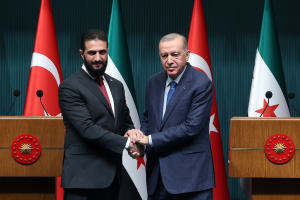Trump admin reportedly reconsiders F-35 jet sale to Turkey amid bipartisan & Israeli concern
'Only America’s strongest allies should be allowed into the F-35 club'

American lawmakers from both sides of the aisle recently raised concerns about deliberations in the Trump administration to approve the sale of advanced F-35 fighter jets to Turkey, the Jewish Insider (JI) reported.
There are two main arguments against the sale, which had already been approved before the first Trump administration suspended and banned Turkey from the Joint Strike Fighter program, through which the F-35 Lightning II is developed and sold.
In 2019, Turkey acquired the Russian-made S-400 air defense system despite U.S. objections, triggering the suspension and following military sanctions.
The other main obstacle to Turkey’s readmission is the existence of U.S. laws ensuring Israel’s qualitative edge over the other militaries in the region, which could be threatened by the acquisition of the advanced F-35 by a Turkish state that has become markedly more hostile to Israel in recent years.
Israel and Turkey recently began negotiations to establish a deconfliction mechanism in Syria, following reports that Turkey was about to take over several bases in the country and possibly equip them with S-400 systems.
Israel then bombed several of those bases, nearly destroying them.
Fox News reported last month that President Donald Trump is considering lifting the ban on the sale after talking with President Recep Tayyip Erdoğan. Trump is reportedly seeking an agreement to either disassemble the S-400 system or move it to a U.S. base in Turkey.
Israeli Prime Minister Benjamin Netanyahu reportedly also brought up the issue and tried to convince the Trump administration not to lift the sanctions during his recent White House visit.
Turkey’s readmission to the F-35 program “simply must not happen,” Jonathan Schanzer, the executive director of the Foundation for Defense of Democracies, told Jewish Insider.
Schanzer, who also testified at a House committee hearing on Turkey last month, emphasized that “The government in Ankara meets America’s criteria to be named a state sponsor of terrorism. Hamas, Islamic State, and Al-Qaeda are among the groups that enjoy Turkish support.”
“Meanwhile, the democracy deficit in Turkey continues to grow amidst a widening autocratic power grab by Recep Tayyip Erdoğan,” Schanzer told Jewish Insider, “In other words, Turkey is not just an unreliable ally. Its policies are indistinguishable from our adversaries.”
“Only America’s strongest allies should be allowed into the F-35 club.”
This position is apparently shared by several lawmakers, both Democrats and Republicans.
“Under Erdogan’s hostile regime, Turkey has repeatedly shown itself to be an ally in name only,” Rep. Gus Bilirakis (R-FL) told Jewish Insider.
“Its blatant disregard for international laws, its actions that are contrary to American interests, coupled with the nation’s military ties with Russia and the S-400 missile systems, and its increasing divergence from NATO’s strategic interests are troublesome.”
Rep. Chris Pappas (D-NH) noted that Erdoğan “continues to threaten reliable democratic allies in the region, including Greece, Cyprus, and Israel.”
“Turkey has still not addressed the issues that led to its ejection from the F-35 program six years ago, and until they do so there is no circumstance under which the U.S. should consider readmitting them or lifting the CAATSA sanctions rightfully placed on them,” he added.
Rep. Dina Titus (D-NV) highlighted the “sudden uptick in violations of Greek airspace with U.S.-provided F-16 jets in Ankara’s possession, and the violations of Greece’s territorial waters which have occurred throughout the last year.”
“This behavior is unacceptable for a NATO ally and poses a continuous threat to the security of a vital European partner.”
Deactivating the S-400 system is a precondition for Turkey’s return to the program, argued Sen. Mike Rounds (R-SD): “As long as they’ve got an agreement to where the Russian S-400 is not available and it’s been locked up and away, I would take a really hard look at it, but I’m open for discussion.”
Despite the deteriorating relations between Israel and Turkey, President Trump has spoken warmly of Erdoğan, and a meeting between State Secretary Marco Rubio and Turkish Foreign Minister Hakan Fidan was described as positive.
According to a readout, they discussed their “close cooperation to support a stable, unified, peaceful Syria."
Fidan reportedly signaled that Turkey could invest in some $20 billion worth of arms purchases if the U.S. lifts the sanctions and the F-35 ban.
The Israeli government sees Rubio as a potential ally on this issue within the administration, and Netanyahu raised the issue several times with him in recent months, according to the Qatari outlet Middle East Eye.

The All Israel News Staff is a team of journalists in Israel.
You might also like to read this:

















